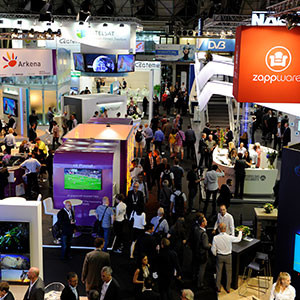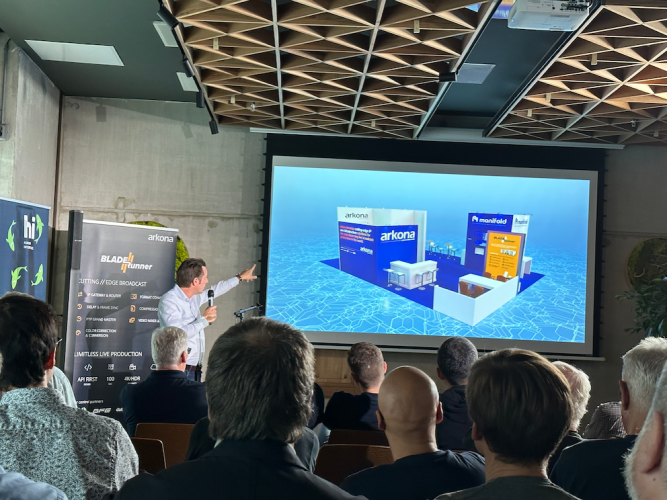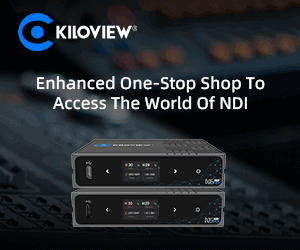First, the disclaimer: as the CEO of a rather large trade show, my opinion is likely to be skewed. However, I wouldn’t be here – now in my eighth year at IBC - if I didn’t truly believe that well-curated trade shows like IBC are a hugely important resource for our industry.
Firstly, successful workflows are complex. We are not working in a world where you can do a quick Google search and find an off-the-shelf product that will solve every issue; systems need to not only do their jobs but also play nicely with many others. These systems can also be costly (as can mistakes), so you don’t want to trust a spec sheet on a screen – you need to talk to knowledgeable product specialists who can answer questions specific to your workflow or facility, and compare notes with adjacent manufacturers down the chain. These conversations can also lead to ideas you hadn’t considered, or the discovery of functions you weren’t aware of… these discoveries only come about with face to face meetings.
Living proof of the importance of personal contact and collaboration can be found at the IBC Innovation Awards, which celebrate the most successful projects of the year. Every year we hear so many nominees say that projects started with conversations at IBC, when they saw the potential of new technologies and could see how to solve their own very specific challenges.
With technology evolving at an unprecedented rate, trade shows like IBC are also key to keeping up with what is out there, what is possible, and what will benefit different organisations. The IBC Conference was founded on technical papers, and they remain absolutely central to the programme; however, it’s no good looking at technology in a vacuum. Therefore we have sessions not just from developers, but from companies that are putting new technologies into practice, who can give a clear-eyed view of the benefits and the pitfalls, the operational and business implications, and – most importantly – the ways in which they can offer new and engaging ways to tell stories.
I said at the beginning that we need well-curated trade shows, and this is an important qualifier. Anyone can put on an exhibition; IBC is organised by the industry, for the industry, and we are not passive. We work hard throughout the year with our content steering committee, the IBC Council, exhibitors and industry leaders to gather data and information about where the industry is headed and what information will be most valuable to visitors. Thanks to the experience and dedication of these people, the IBC show continually evolves.
A great example of this is the Leaders’ Summit. A few years ago we recognised that the shift from an engineering-led business to a creative and commercial one meant that we had to engage at CEO level. By helping C-level executives understand what the technology allowed them to do, they would be better equipped to develop strategic pathways for their businesses, which would maximise return. This invitation-only, behind-closed-doors day ensured that the people in the room could freely exchange ideas and opinions with their peers. It remains a cornerstone of the IBC Conference, and has led to additional C-level sessions such as the Cyber Security Forum and the Telco and Media Innovation Forum. Again, these are hosted, high level events that bring new people and new businesses into the IBC community, and provide advocacy and context for the rapidly developing world of media.
As the lines continue to blur between industries, we’re also bringing new ideas from converging markets. The brand new Global Gamechangers stage will welcome a broad range of future-facing talent, creative minds and business influencers who are making waves around the world in business, digital, creative, transformation and news.
Some features of IBC develop in smaller increments, like the exhibition element. Now covering 15 halls, we have made strides in bringing in new companies from outside the traditional broadcast sphere, again keeping pace with industry changes, while growing the footprint of traditional broadcast manufacturers and developers. We are seeing exhibitors evolve in the way they tell their stories; it’s no longer about black boxes with blinking lights, and they need to sell less tangible (though no less important) products and services as software or in the cloud – so they are devising clear, compelling and exciting ways to present them. We also recognise that marketing budgets are not what they were, but with the growth and evolution of the rest of the show, we work hard to ensure that IBC attracts the serious global visitors that our exhibitors want to see.
IBC offers far, far more than a web search or even a meeting with a local reseller or one manufacturer ever could. IBC is a global conference, exhibition, technology showcase and networking opportunity all under one roof; it offers a unique platform to hear from industry leaders from around the world, experience state-of-the-art innovations, and then discuss it all over a beer at The Beach.
And that, actually, is the key element – the importance of a well-curated trade show is to allow people to share their knowledge and experiences and become part of the debate. I look forward to hearing your views and ideas in Amsterdam in September.







































